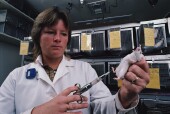- Could Your Grocery Store Meat Be Causing Recurring UTIs?
- Are You Making This Expensive Thermostat Error This Winter?
- Recognizing the Signs of Hypothyroidism
- 10 Strategies to Overcome Insomnia
- Could Artificial Sweeteners Be Aging the Brain Faster?
- Techniques for Soothing Your Nervous System
- Does the Water in Your House Smell Funny? Here’s Why
- Can a Daily Dose of Apple Cider Vinegar Actually Aid Weight Loss?
- 6 Health Beverages That Can Actually Spike Your Blood Sugar
- Treatment Options for Social Anxiety Disorder
Rise in Use of Animals for Research


There has been a surge in the use of animals in experimental research in the United States since the late 1990s, with mice accounting for most of the increase, a new study indicates.
The findings challenge research industry claims of decreased use of animals, the study authors said.
The study authors analyzed unpublished data from the U.S. National Institutes of Health on the use of all vertebrate species at the 25 research institutions that are the largest recipients of grants from the federal government.
The results showed that the use of animals in research at these facilities rose nearly 73 percent from 1997 to 2012, mainly due to increases in the use of mice. There were declines in the use of cats, dogs, primates, rabbits, hamsters and other larger mammals.
Unregulated species — mice, rats, birds bred for experimentation, and cold-blooded creatures — accounted for nearly 99 percent of the animals used in the labs, according to the study published online Feb. 25 in the Journal of Medical Ethics.
The findings match reports from other countries about increased use of mice for genetic modification, wrote study author Alka Chandna, from the laboratory investigations department of People for the Ethical Treatment of Animals, and colleagues.
They said there is growing public opposition to animal experimentation, along with evidence that animal studies often don’t translate to humans, and added that there are new technologies that can be used in research instead of animals.
The findings show that more needs to be done to reduce the use of animals in scientific research and for more transparency in reporting on whether this is being achieved, the study authors said.
While there is still tension between researchers and animal rights advocates, both sides seek to better understand one another, according to an accompanying commentary by Dr. Lisa Hara Levin, medical director of Animal Care & Control of New York City.
She said research institute policies need to be updated to better inform the public about their use of animals, and called for increased dialogue between a wide range of interested parties.
More information
The Humane Society of the United States has more about animal testing.
Source: HealthDay
Copyright © 2026 HealthDay. All rights reserved.










